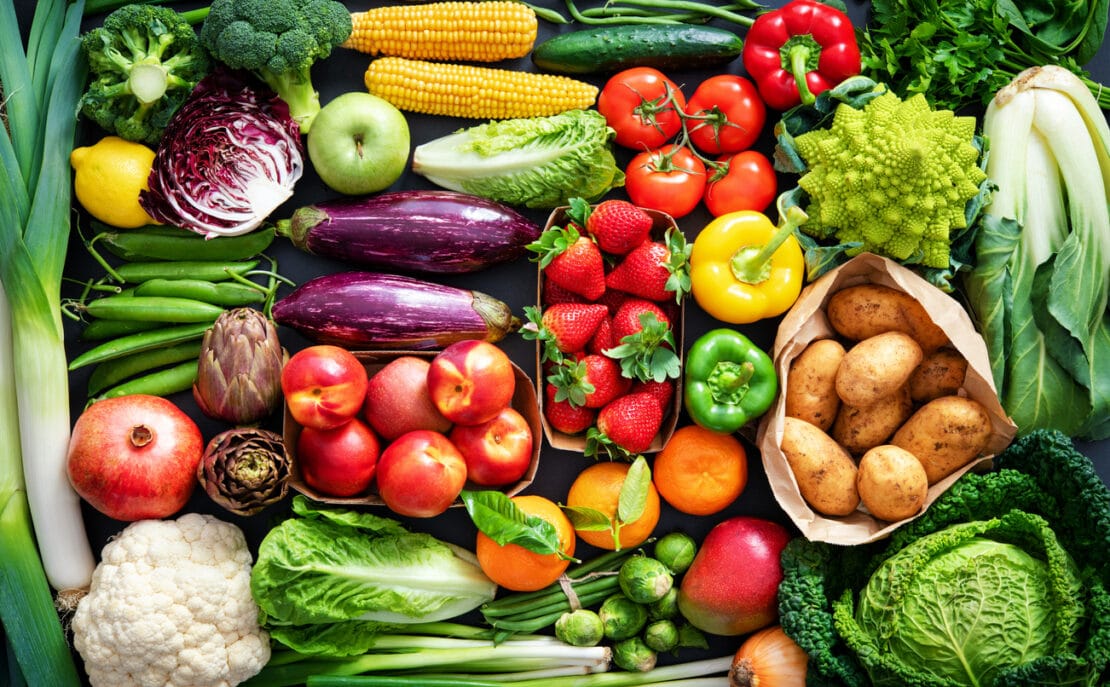You may have wondered as you do your grocery shopping: How safe are those piles of produce laying out in the open?
Do unwrapped apples, bananas, potatoes, onions, and other fruits and vegetables collect coronavirus as people walk past all day?
Early in the pandemic, Professor Vishal Shah wondered the same thing.
He did what many others were doing at the time: He painstakingly cleaned the produce he brought home from the grocery store, washing it with soap and water.[1]
His 13-year-old son Anand questioned the practice, saying he was skeptical it did any good.
Professor Shah, a researcher at West Chester University in Pennsylvania, decided to find out if his son was right. He devised a study and turned it into a father/son project.[2]
You Won’t Catch Coronavirus from Fruits and Vegetables

Professor Shah in his lab with his son Anand. Image: inquirer.com
The pair visited 10 grocery stores in the Philadelphia area, New Jersey, and Delaware. They shopped during peak times of 10 a.m. to 6 p.m. when customer traffic was highest.[3]
The father and son selected unwrapped produce that included apples, avocados, bananas, broccoli, carrots, potatoes, and lettuce. They tested 140 pieces of produce in all, taking five sample swabs from each.
The verdict?
Just one piece of produce—an apple—had traces of the virus.
The Shahs concluded that it would be difficult, if not impossible, to get COVID-19 from unwrapped grocery store produce. They published their findings in the journal ACS Food Science & Technology.[4]
Anand said his father no longer bothers to disinfect fruits and vegetables.
“This changed how we handle produce at our house and our relatives’ houses,” he said. “The biggest take-home message for me was that we can handle produce as we did before the pandemic.”
In fact, recent studies show that COVID-19 rarely spreads from surfaces. People typically catch it by breathing contaminated air.
A recent article in the journal Nature concluded that surface transmission is possible, but rare. “It just doesn’t seem to happen much, as far as we can tell,” said epidemiologist Dr. Ben Cowling. He is a professor at the University of Hong Kong.[5]
Environmental engineer Amy Pickering is a researcher at Tufts University. She has examined the risk of touching surfaces that are contaminated with coronavirus.
She found that even if you come into contact with an object that has the virus on it, you have a less than 1 in 2,000 chance of getting infected.
Quarantining groceries and disinfecting surfaces are not worth the trouble, Pickering said.
“That’s a lot of work and it also is probably not reducing your exposure that much,” she said. Mask wearing, social distancing, and handwashing are more effective strategies, she added.
Get the Latest Breaking News About Coronavirus Here
- The Alarming COVID Vaccine Side Effect Every Woman Should Know About. It’s sending some women running to their doctors into a panic. Click HERE to read more.
- J&J Vaccine Blood Clots: Get the Facts. Is this potentially deadly side effect something you should worry about? Click HERE to read more.
- Omega-3s Cut COVID Death Risk, Study Finds. Most people take fish oil for heart health. But new research shows it could offer an important added benefit during the pandemic. Click HERE to read more.
References:
[1] https://www.inquirer.com/health/coronavirus/covid-coronavirus-grocery-store-vegetables-20210326.html
[2] https://www.wcupa.edu/sciences-mathematics/vShah.aspx
[3] https://medicalxpress.com/news/2021-03-father-son-grocery-uncontaminated-covid-.html
[4] https://pubs.acs.org/doi/10.1021/acsfoodscitech.1c00064
[5] https://www.nature.com/articles/d41586-021-00251-4

